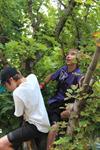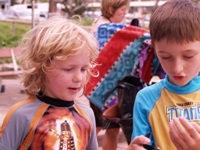Build a Foundation Towards a Career Working With Children
Child Psychology is a compelling area of study. Children are continually evolving from the moment they are born, learning from every interaction and fine tuning their skills. Throughout infancy they form attachments with caregivers, develop language, and learn to walk and explore their environment. Later on children develop a sense of what is right and wrong, they learn social roles and how to think abstractly.
Why Psychologists Study Childhood Development
Psychologists study children and their development because it helps us to understand what is normal behaviour for a child at any particular age. This helps us to recognise when a child might have problems and if they need extra support. The study of child psychology also helps us to understand more about ourselves as people, our relationships and families.
By studying this course you will learn:
 What is meant by child development.
What is meant by child development.- What is involved in different areas of development, such as: cognitive, moral, social and language development.
- How development can be influenced by nature, nurture, temperament, parents, schools and other factors.
- To apply your knowledge and understanding to real life observations.
Graduates will develop a solid foundation in child psychology which they can use towards further study or qualifications.
The knowledge you develop can be applied to a range of different professions which involve working with children.
COURSE STRUCTURE AND CONTENT
There are 12 lessons in this course:
 1. Introduction to Child Psychology
1. Introduction to Child Psychology
- Levels of development.
- Nature or nurture.
- Isolating hereditary characteristics.
- Cause versus correlation.
- Continuity versus discontinuity.
- Cross sectional and longitudinal studies.
- Reliability of verbal reports.
2. The Newborn Infant
- The Interactionist Approach.
- Range of Reaction.
- Niche Picking.
- Temperament Stimulus seeking.
- Emotional Disturbances During Pregnancy.
3. States and Senses of the Infant
- Sensory Discrimination.
- Infant States (sleep, inactivity, waking, crying etc.).
- Why are Psychologists so concerned with defining and describing infant states?
- Habituation.
- Crying.
- Soothing a Distressed Baby.
- Sound Discrimination.
- Smell and Taste Discrimination.
- Visual Discrimination.
- Depth Perception.
- Oral Sensitivity.
4. Learning
- Habituation.
- Vicarious Learning.
- Classical Conditioning.
- Operant Conditioning.
- Reinforcement.
- The Importance of Learning Control, etc.
5. Emotions and Socialisation
- Producing and Recognising Emotional Expression.
- Smiling, Biological Explanation.
- Perceptual Recognition Explanation.
- The Mother-Child Attachment.
- Freudian Approach Bowlby's Approach.
- Social Learning Approach.
- Harlow's Approach.
- The Role of Cognition in Attachment Formation.
- Maternal Attachment.
- Fear, Social Learning.
- Perceptual Recognition.
- Women's Dual Role as Mothers and Workers, day care.
6. Cognitive Development
- Developing the Ability to Reason.
7. Language Development
- Is language learned, or are we genetically programmed with it?
- The Social Learning Approach.
- The Hypothesis Testing Approach.
- Under Extending.
8. Intelligence
- Measuring Intelligence.
- Cultural Bias.
- IQ.
- Testing Intelligence as a tool.
9. Socialisation: Part A
- Social Cognition - self awareness, awareness of others as individuals in their own right, the development of empathy, taking turns, having a point of view/perspective, ability to see something from another person's perspective.
- Friendships.
- Social Scripts, Scripts that Pretend Play.
10. Morality
- Moral development.
- Aggression & Altruism.
- Freud's Approach.
- Piaget's Approach.
- Kohlberg's Approach.
11. Sexuality
- Freud's phases (oral phase, anal phase, phallic phase, latent phase, genital phase).
- The Acquisition of Gender and Role Identity.
- Concept of Psycho-Social Development.
12. Socialisation: Part B
- The Family Influence.
- Discipline.
- Siblings.
- Family Structures.
- School Influence.
- Peer Influence.
- Acceptance and Rejection.
- Imitation and Reinforcement.
COURSE AIMS
* Identify key concepts and issues in child psychology
* Understand theories on the psychology of the newborn infant
* Explain the different types of sense discrimination that babies develop
* Identify how children learn and influences on learning
* Discuss theories of emotion and their basis in child behaviour
* Explain how children develop cognitively
* Explain how children develop language
* Explain influences on the development of intelligence in a child
* Explain personal aspects of socialisation
* Explain factors affecting the development of morality in children
* Explain the development of sexuality within children
* Explain the impact of schooling and family structures on personality development
HOW THE COURSE WORKS
You can start the course at any time.
It is studied by distance learning, so you can study in the comfort of your own home. But this doesn't mean you are all alone in your studies. Our highly qualified and friendly tutors are there to help you every step of the way. If you have any questions at all, they are always happy to help.
Each lesson includes set tasks, and is completed with an assignment which the student submits to their course tutor. The tutor will mark the assignment and return this to the student with comments and suggestions for further reading.
This course will show you how children develop psychologically as they grow, and what factors (such as learning, parenting styles, reinforcement, and genetic makeup) influence their behaviour and thinking. Anyone who lives or works with children will gain valuable insights into child behaviour. Students of counselling or psychology will be better prepared to understand childhood influences on later adult behaviour.
ACS Student feedback:
"It's very interesting. I am always fascinated by children's behaviour. It helps in my work and with my own children to have a clear understanding of their nature/nurture. I made the right choice (when I chose this) course. The credit goes to ACS." Judy Augustine, Child Care worker, Child Psychology course.
How This Course Could Help You
The Child Psychology course is intended to be of benefit to people who would like to work in, or who currently work in, the following fields:
Youth work
Child and adolescent counselling
School counselling
Teaching, teacher aides & school employees
Child psychology
Social work
Child care
Children's services
Medical and health professions
The course can be studied by itself or as part of a certificate or higher level qualification. For those wishing to take things further it may be helpful towards entry onto degree level courses.
ANY QUESTIONS?
If you have any questions, please do get in touch with us - connect with our expert tutors, use our FREE COURSE COUNSELLING SERVICE.